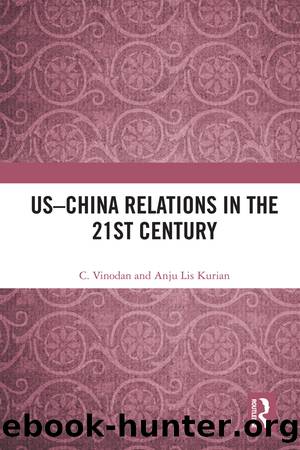Us-China Relations in the 21st Century by C Vinodan & Anju Lis Kurian

Author:C Vinodan & Anju Lis Kurian [Vinodan, C & Kurian, Anju Lis]
Language: eng
Format: epub
Tags: International Relations, Social Science, Political Science, Geopolitics, General
ISBN: 9780367365998
Google: ZrdLEAAAQBAJ
Goodreads: 58501700
Publisher: Routledge Chapman & Hall
Published: 2021-11-30T00:00:00+00:00
Initially, RCEP signatories set out an ambitious 3-year timeline for concluding the RCEP negotiations, but the discussions turned out to be more prolonged than anticipated. For example between 2013 and 2018 around 22 rounds of working-level RCEP consultations were conducted because the dialogues were slow and contentious in problematic issues of barriers to services trade, investment rules, and intellectual property rights. Besides, political obligation was being ratcheted up on trade negotiators in the midst of trepidations about intensifying protectionism and an enduring trade war between Washington and Beijing (Wignaraja, 2018). The prominence of RCEP is largely economic, and the agreement would cover all of East Asia, where major manufacturing firms have extensively established their supply-chain networks. The proposed intraregional trade would facilitate China to accumulate more cost-competitive exporting supremacy to the US as the agreement would remove or greatly reduce the tariffs levied on the manufacturing components like auto parts exported throughout the area. Also, the RCEP would serve as a building block for the multilateral trading system because of its capacity to harmonise rules and facilitate business transactions across the numerous as well as overlapping FTAs in the region (Terada, 2018). According to the International Monetary Fund (IMF), with the exception of Laos, China could establish themself as the biggest trading partner of the 14 out of 15 RCEP member states. The member statesâ heavier economic reliance on China put up it into the regional economic epicentre that would adversely affect the US in dual ways. First, this would diminish Asian dependence on the American market. American products as well as businesses may be discriminated in the East Asian market, and higher tariffs may be imposed on exports from the United States and these will negatively affect its economic development. Second, RCEP comprises key US allies like Japan, South Korea, and Australia and strategic allies such as India, Indonesia, Singapore, and Vietnam. The closer economic interdependence of US partners with Beijing could give China a strategic leverage over these American partners. The statistics predict that if RCEP materialises, the simulated economic effects on GDP growth would put down the American economy by 0.16 per cent (Terada, 2018).
PRCâs interest behind the promotion of RCEP is grounded on three-fold motivations which are the following. First, at the beginning Beijing regarded RCEP as a vital constituent of its regional integration proposal in its strategic retort to TPP which was the economic element of rebalance in the Pacific commenced by the US. Second, Chinaâs engagements in RCEP negotiations by reflecting diverse domestic preferences not only strengthen their voice but also raise heated debates on its identities as well as regional roles. Third, China makes RCEP a legitimate and successful regional initiative with the help of regionally acknowledged norms which have evolved through long-term cooperative processes (Tae-Kyung, 2015). Presently, after the withdrawal of India, RCEP negotiations are going on between 15 countries in the Asian and Pacific expanse, comprising members of the ASEAN and other significant trading countries such as China, Australia, New Zealand, South Korea, and Japan (Jaipragas, 2019).
Download
This site does not store any files on its server. We only index and link to content provided by other sites. Please contact the content providers to delete copyright contents if any and email us, we'll remove relevant links or contents immediately.
Spell It Out by David Crystal(35861)
Life for Me Ain't Been No Crystal Stair by Susan Sheehan(35550)
Cecilia; Or, Memoirs of an Heiress — Volume 1 by Fanny Burney(32093)
Cecilia; Or, Memoirs of an Heiress — Volume 3 by Fanny Burney(31481)
Cecilia; Or, Memoirs of an Heiress — Volume 2 by Fanny Burney(31435)
The Great Music City by Andrea Baker(30932)
Professional Troublemaker by Luvvie Ajayi Jones(29445)
We're Going to Need More Wine by Gabrielle Union(18664)
Twilight of the Idols With the Antichrist and Ecce Homo by Friedrich Nietzsche(18324)
The Secret History by Donna Tartt(18269)
All the Missing Girls by Megan Miranda(14858)
Cat's cradle by Kurt Vonnegut(14804)
Pimp by Iceberg Slim(13828)
Bombshells: Glamour Girls of a Lifetime by Sullivan Steve(13718)
Fifty Shades Freed by E L James(12937)
Talking to Strangers by Malcolm Gladwell(12916)
Norse Mythology by Gaiman Neil(12880)
The Social Justice Warrior Handbook by Lisa De Pasquale(11969)
Underground: A Human History of the Worlds Beneath Our Feet by Will Hunt(11857)
